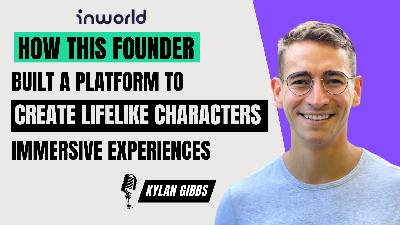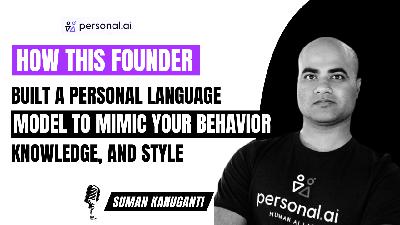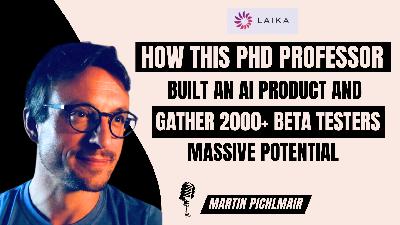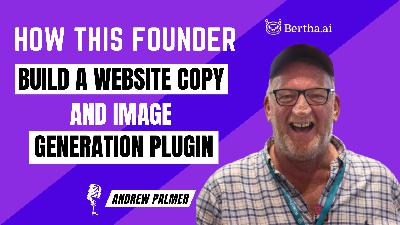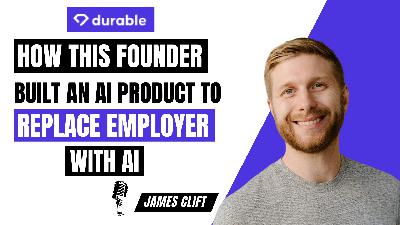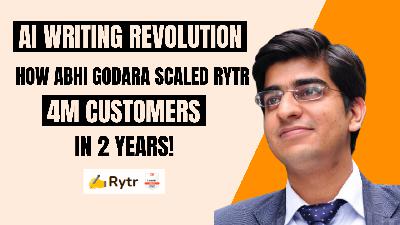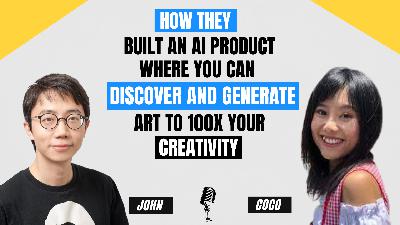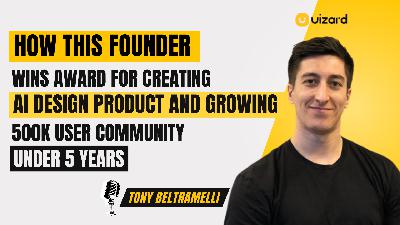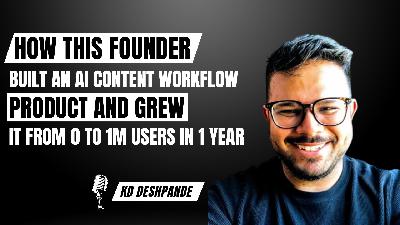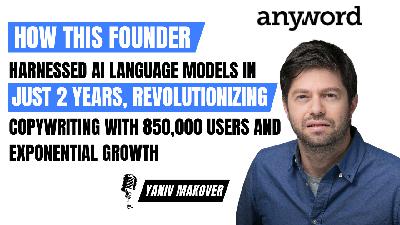This founder built an AI game that attracted 100K users in its first week of launch.
Description
Nick Walton is the CEO of Latitude, an AI-gaming company known for creating the first-of-its-kind AI-generated text adventure, AI Dungeon. A builder at heart, he created the first version of AI Dungeon in early 2019, a revolutionary experience that had 100,000 users in its first week after being launched. Along with continuing to develop AI Dungeon, Latitude is re-imagining what games could look like with AI and is working on a platform that will enable creators to make their own unique AI powered games. In today's episode, We discusses the early stages of his startup, focusing on the challenges they faced and their approach to overcoming them. They also explored optimization techniques for model deployment and AI provider evaluation. Nick emphasizes the importance of focusing on fundamental human values and needs when developing AI-driven products, rather than novelty and short-lived appeal. Tune in to hear Nick's insights and experiences in building Latitude and how you can apply these lessons to your own business.
Find the full transcript at: https://www.aiproductcreators.com/
Where to find Nick Walton:
• LinkedIn: https://www.linkedin.com/in/waltonnick/
Where to find Dhaval:
• LinkedIn: https://www.linkedin.com/in/dhavalbhatt
In this episode, we cover:
[00:01:00 ] - Introduction to Nick and AI Dungeon
[00:03:45 ] - Initial challenges faced by AI Dungeon
[00:09:03 ] - Energy expenditure in the early days: dataset and fine-tuning
[00:10:05 ] - The role of ML operations in AI Dungeon
[00:11:44 ] - AI Dungeon: A game company that uses AI
[00:12:05 ] - Adapting technology and unit economics
[00:13:03 ] - Balancing user expectations and cost
[00:14:02 ] - Optimizing operations and advice for aspiring AI entrepreneurs
[00:16:23 ] - Tapping into instinctual user needs
[00:17:43 ] - The future of AI in gaming
Transcript:-
Dhaval:
Welcome to the podcast, Nick. Tell us a little bit about your product.
Nick:
Yeah, our main product is AI Dungeon. So it's an AI powered role play adventure game where people can jump into variety of different AI experiences and make choices that result in a fun and interesting story. So, traditional text adventures where there's a limited set of options you can really select and you go down a path that a developer pre-imagined with AI dungeon every time the story is unique written by an AI. And so you have freedom to create all kinds of different stories that the developers us would never have imagined possible.
Dhaval:
That's amazing so. Is this like a video game? I've never played Dungeon before. So what is this for people who have never played Dungeon? Is this a video game? Is this like a regular board game? Tell me a little bit about that.
Nick:
Yeah, it's like a video game like a classic text adventure game where the game shows some story of where you're at and you type actions and then there's a result. It's a little bit more towards the end of a creative sandbox than it is a really structured game with lots of mechanics. So it's more on the story roleplay side.
Dhaval:
Got it.Wonderful. So how do you serve your customers? Is this a mobile app? Is this a web app?
Nick:
Yeah, We are on mobile and on the web both.
Dhaval:
Wow Okay. And is there a specific segment of your customers, of video game players or other players that you address with your game?
Nick:
Yeah, I think for ours, we're especially targeting kind of role play gamers. So gamers who are interested in role-playing games like DnD and tabletop ones, as well as our traditional game RPGs, like Skyrim and things like that. Where you get to kind of decide who you are and what direction, and what actions you want to take in a more open environment
Dhaval:
wornderful Tell me a little bit about your own journey. Are you a game developer or are you a techie who got interested in games? Or are you a business person who decided to try a new idea? Tell us little bit about your personal background.
Nick:
Yeah, definitely the techie category. So, I come from a machine learning background. Before I ended up doing this, I spent a couple summers at self-driving car companies. I was going to go work at Aurora. And this side project that I'd been working on AI dungeon, just kind of took off on the internet and I realized there's something cool here that people are excited about. So, I pivoted from where I was going to be a founder. So I have learned lots about kind of game industry and the business side since starting Latitude. But going in, I just had the kind of tech machine learning AI background.
Dhaval:
And Is Latitude already generating revenue? Is that a revenue positive organization?
Nick:
Yeah, we just reached profitability pretty recently.
Dhaval:
Wow. Congratulations. That must be a big deal. So if you could share any information on your revenue or your number of users, or any capital that you may have raised that will help us understand the context of your product.
Nick:
Yeah. We've raised over 4 million. Since we've reached profitability, we haven't had to raise in the last little while. We've had millions of users download AI dungeon and we have a pretty active excited player base.
Dhaval:
Wow. Millions of users profitability. And when was the last time you raised?
Nick: End of 2020.
Dhaval:
Wow, more than two years ago. So you are a fairly successful case study here in terms of building an AI product. I would love to dig in a little bit here in terms of what was your journey like in terms of building the product? So you said you are a techie, you have background in machine learning. Did you find some video game players, video game creators? Did you have a passion in this space yourself? How did you go about creating a business model and a product canvas for your capabilities?
Nick:
Yeah, it's kind of funny because I think I very much came at it from like hacker creator who got kind of surprised. And so I feel like it's taken me a while to catch up on some of these other things around understanding our product, what it is kind of game industry space. So the way it really got started was just at a hackathon. I was just playing around with the smallest version of GPT-2 had just come out. So it was a hundred million parameters, a thousand times smaller than the language models of today. But even then I could see how this kind of AI's ability to do dynamic storytelling was really fun and interesting. So I got super obsessed with it. Worked on it over the next like nine months. I would have my friends play and I'd just like watch them and see kind of what their experience was, what was challenging and what made it more interesting. And so put it on the internet, not expecting that it would really launch off and be a product. And, so I was kind of surprised of scramble after that to figure out how do we make a product out of this so that people can continue playing. Because when it first launched, it was on Google Colab. And there was so much traffic. I knew that they could not let it be there for very long. So, I wanted to get an actual app and product place where people could continue to play it and not rely on Google Colab's GPU generosity for more than a little bit.
Dhaval:
Wow. Colab, for people who are not aware of is like a script writing tool. Is that right? It's like one of those web editors in which you can write code. Is that true?
Nick:
Yeah, the thing that was cool about it is Google generously lets people use it and run on their GPUs for free. And they have paid plans as well. So it was a way that. People can run machine learning models and try them out themselves, and so that's how AI Dungeon was first distributed was just as code that would run in these Google Colab notebooks.
Dhaval:
Wow. So what was the journey like for you when you finalized the product and you are ready to launch it? Did you partner up with other business co-founders or are you the sole founder of this product? Tell us a little bit about your partnership.
Nick:
Yeah, once the game really started kicking off and I realized there was something interesting here. I pulled in my older brother who's worked at a bunch of tech startups to co-found a startup around this with me. So for the first couple months, it was just us with a couple people advising or helping out here and there. And then we raised our first round of funding and got kind of initial team together. And then we started going forward from there. So that's kind of what it looks like.
Dhaval:
Got It. So when you started this, you built this on top of GPT-2, which was a thousand times smaller than what we have now. And when you say a hundred million parameters I'



